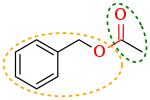部分 (化学)
有機化学において、部分(ぶぶん、英: moiety)とは、文字通り分子の一部分を指すために用いられる用語である[1]。より大きな「部分」はしばしば官能基である[2] 。

→詳細は「官能基」を参照
官能基は似た化学反応に関与する部分であり、ほとんどの分子が含んでいる[3]。次に、官能基の一部分は「部分」と呼ばれる。例えば、パラヒドロキシ安息香酸メチルはアシル部分内にフェノール官能基を含み、次にアシル部分はパラベン部分の一部である。
活性部分
編集薬理学では、活性部分(英: active moiety)とは、分子またはイオンの(不活性部分を除いた)部分であり、原薬の生理活性または薬理活性に関与するものである。原薬の不活性部分には、エステルのアルコール部分や酸部分、塩(水素結合や配位結合を有する塩を含む)、または他の非共有結合誘導体(錯体、キレート、クラスレートなど)が含まれることがある[4][5]。親薬物はそれ自体が不活性なプロドラッグの場合もあり、活性部分は親薬物から遊離型で放出されると活性化する。
脚注
編集- ^ IUPAC, Compendium of Chemical Terminology, 2nd ed. (the "Gold Book") (1997). オンライン版: (2006-) "moiety".
- ^ Mezey, P. G. (October 1996). “Functional Groups in Quantum Chemistry”. Advances in Quantum Chemistry 27: 165. ISBN 978-0-08-058252-8.
- ^ IUPAC, Compendium of Chemical Terminology, 2nd ed. (the "Gold Book") (1997). オンライン版: (2006-) "functional group".
- ^ “CFR – Code of Federal Regulations Title 21”. United States Food and Drug Administration (1 April 2018). 15 February 2019閲覧。
- ^ “Electronic Code of Federal Regulations Title 21: Food and Drugs § 314.3”. Electronic Code of Federal Regulations. United States Government Publishing Office (22 January 2019). 15 February 2019閲覧。 “Active moiety is the molecule or ion, excluding those appended portions of the molecule that cause the drug to be an ester, salt (including a salt with hydrogen or coordination bonds), or other noncovalent derivative (such as a complex, chelate, or clathrate) of the molecule, responsible for the physiological or pharmacological action of the drug substance.”